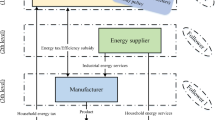Abstract
This study analyzed various electricity procurement scenarios for a factory in terms of carbon neutrality, using multi-agent simulations. We performed a multi-agent simulation with power-consuming and power-generating agents to simulate the electric power market. Additionally, we developed a factory model reflecting the actual electricity consumption patterns and implemented multiple electricity procurement methods for the factory: market procurements, photovoltaic power generation (PV), fuel cells (FC), and batteries. Using this simulation model, we analyzed the total \({\textrm{CO}}_{2}\) emissions and total cost of carbon neutrality by changing the factory’s capacity for PV, FC, batteries, and the generation cost of FC. As a result, we found that batteries can enhance the effects of PV. Furthermore, unfortunately, when the capacity of the batteries is larger, the generation cost of FC for FC activation will be required to become lower, which leads to a discussion of the future price target of FC. Our study successfully demonstrated that realistic multi-agent simulations enable complex phenomenon analyses.
Access this chapter
Tax calculation will be finalised at checkout
Purchases are for personal use only
Similar content being viewed by others
Notes
- 1.
- 2.
- 3.
- 4.
https://www.kansai-td.co.jp/denkiyoho/download/index.html, and the effect of the utilization ratio \(o_{\textrm{pv}}\) is excluded.
- 5.
According to https://www.nedo.go.jp/content/100926249.pdf.
- 6.
- 7.
This calculation is considered under the generation efficiency assumed in this study.
- 8.
- 9.
References
Chuang, A.S., Wu, F., Varaiya, P.: A game-theoretic model for generation expansion planning: problem formulation and numerical comparisons. IEEE Trans. Power Syst. 16(4), 885–891 (2001)
Day, C.J., Bunn, D.W.: Divestiture of generation assets in the electricity pool of england and wales: a computational approach to analyzing market power. J. Regulat. Econ. 19(2), 123–141 (2001)
Ghaffari, M., Hafezalkotob, A., Makui, A.: Analysis of implementation of Tradable Green Certificates system in a competitive electricity market: a game theory approach. J. Ind. Eng. Int. 12(2), 185–197 (2016)
Helleboogh, A., Vizzari, G., Uhrmacher, A., Michel, F.: Modeling dynamic environments in multi-agent simulation. Auton. Agents Multi-Agent Syst. 14(1), 87–116 (2007)
Jiang, Y., Zhou, K., Lu, X., Yang, S.: Electricity trading pricing among prosumers with game theory-based model in energy blockchain environment. Appl. Energy 271, 115239 (2020)
Kan, S., Shibata, Y.: Study on FIP policy design by using multi-agent based electric power market simulation model (2020). https://eneken.ieej.or.jp/en/report_detail.php?article_info__id=8918
Kitano, H., Tadokoro, S.: RoboCup rescue: a grand challenge for multiagent and intelligent systems. AI Maga. 22(1), 39–39 (2001)
Kok, J.K., Warmer, C.J., Kamphuis, I.G.: PowerMatcher: multiagent control in the electricity infrastructure. In: Proceedings of the Fourth International Joint Conference on Autonomous Agents and Multiagent Systems, pp. 75–86. Association for Computing Machinery (ACM) (2005)
Oh, H.S., Thomas, R.J.: Demand-side bidding agents: modeling and simulation. IEEE Trans. Power Syst. 23(3), 1050–1056 (2008)
Sensfuß, F.: Assessment of the impact of renewable electricity generation on the German electricity sector: an agent-based simulation approach (2007). https://doi.org/10.5445/IR/1000007777
Sensfuß, F., Ragwitz, M., Genoese, M.: The merit-order effect: a detailed analysis of the price effect of renewable electricity generation on spot market prices in Germany. Energy Policy 36(8), 3086–3094 (2008)
Torii, T., Izumi, K., Yamada, K.: Shock transfer by arbitrage trading: analysis using multi-asset artificial market. Evol. Inst. Econ. Rev. 12(2), 395–412 (2015)
Trigo, P., Marques, P.: The electricity market as a multi-agent system. In: 5th International Conference on the European Electricity Market, pp. 1–6. IEEE (2008)
Weiss, O., Bogdanov, D., Salovaara, K., Honkapuro, S.: Market designs for a 100% renewable energy system: case isolated power system of Israel. Energy 119, 266–277 (2017)
Zhou, Z., Zhao, F., Wang, J.: Agent-based electricity market simulation with demand response from commercial buildings. IEEE Trans. Smart Grid 2(4), 580–588 (2011)
Acknowledgements
This work was supported by Panasonic Holdings Corporation.
Author information
Authors and Affiliations
Corresponding author
Editor information
Editors and Affiliations
Rights and permissions
Copyright information
© 2023 The Author(s), under exclusive license to Springer Nature Switzerland AG
About this paper
Cite this paper
Hirano, M., Wakasugi, R., Izumi, K. (2023). Analysis of Carbon Neutrality Scenarios of Industrial Consumers Using Electric Power Market Simulations. In: Aydoğan, R., Criado, N., Lang, J., Sanchez-Anguix, V., Serramia, M. (eds) PRIMA 2022: Principles and Practice of Multi-Agent Systems. PRIMA 2022. Lecture Notes in Computer Science(), vol 13753. Springer, Cham. https://doi.org/10.1007/978-3-031-21203-1_6
Download citation
DOI: https://doi.org/10.1007/978-3-031-21203-1_6
Published:
Publisher Name: Springer, Cham
Print ISBN: 978-3-031-21202-4
Online ISBN: 978-3-031-21203-1
eBook Packages: Computer ScienceComputer Science (R0)




